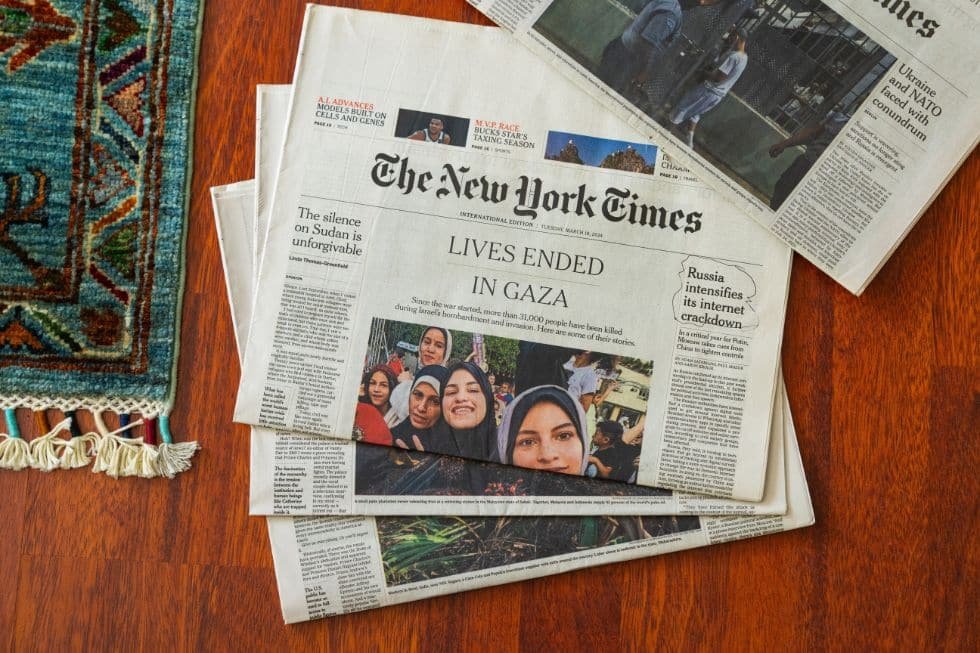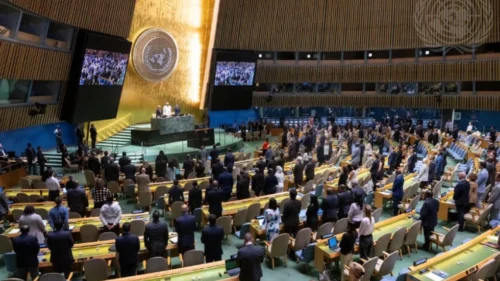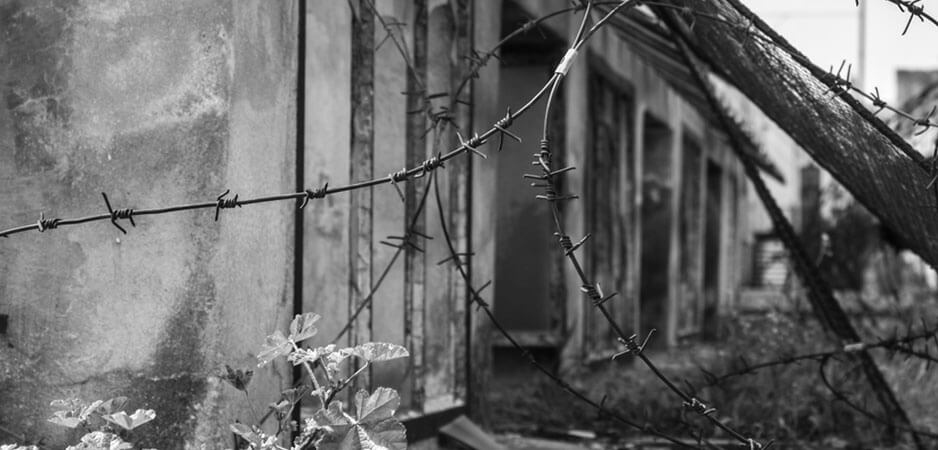The first stanza of the English version of French composer Charles Trenet’s celebrated song, “Que reste-t-il de nos amours ?” reads:
I wish you bluebirds in the spring
To give your heart a song to sing
And then a kiss, but more than this
I wish you love.
These lyrics (by the way, very different from the untranslatable French original) imply an interesting hierarchy of romantic values. The “kiss” is already an important gesture indicating a desire for intimacy. But beyond it, and far more important, is “love.” It’s the difference between a fleeting and ephemeral moment and the enduring state. A kiss is a brief, thrilling, possibly unforgettable moment, but love defines a lasting relationship and ultimately a form of sustainable communion.
In a radically different context, Australian journalist and Fair Observer contributor Caitlin Johnstone employed similar logic in the title of a newsletter she circulated last week: “It’s A Genocide, But It’s Also So Much More Than That.”
Today’s Weekly Devil’s Dictionary definition:
But more than this (or that):
A common rhetorical device, with an effect similar to hyperbole, used to introduce a degree of extremity that goes beyond the scope of a value presented as a threshold. The expression is rarely encountered in the context of already extreme phenomena such as genocide, but contemporary history in the Middle East offers exceptional cases in which standard hyperbole proves radically insufficient.
Contextual note
Johnstone’s message begins with the mention of genocide, increasingly accepted as applicable to the situation in Gaza even by commentators who formerly denied the equivalence. Even for those who quibble about precise meanings of the 20th century neologism have in recent months found it problematic to deny the accuracy of the claim that Israel is carrying out a genocide. After all, if English media personality Piers Morgan has come around to using the G-word, there must be something to it. And if that isn’t enough, two Israeli humanitarian organizations, B’Tselem and Physicians for Human Rights Israel, have called “on Israelis and the international community to take immediate action to stop the genocide.”
But Johnstone doesn’t stop at acknowledging the reality. She sees “more than” the word or the legal formulation that justifies invoking it. The full text of her tirade is well worth reproducing here:
“The mass atrocity in Gaz is a genocide, obviously, and is an undisguised ethnic cleansing operation.
But it’s also a lot more than that.
It’s an experiment — to see what kinds of abuses the public will accept without causing significant disruption to the imperial status quo.
It’s a psychological operation — to push out the boundaries of what’s normal and acceptable in our minds so that we will consent to even more horrific abuses in the future.
It’s a symptom — of Zionism, of colonialism, of militarism, of capitalism, of western supremacism, of empire-building, of propaganda, of ignorance, of apathy, of delusion, of ego.
It’s a manifestation — of violent racist, supremacist and xenophobic belief systems that have always been there but were previously restrained, meeting with the unwholesome nature of alliances that have long been in place but have been aggressively normalized.
It’s a mirror — showing us accurately and impartially who we currently are as a civilization.
It’s a disclosure — showing us what the western empire we live under really is underneath its fake plastic mask of liberal democracy and righteous humanitarianism.
It’s a revelation — showing us who among us really stands for truth and justice and who has been deceiving us about themselves and their motives this entire time.
It’s a catalyst — a galvanizing force and a rallying cry for all who realize that the murderous power structures we live under can no longer be allowed to stand, and a blaring alarm clock opening more and more snoozing eyes to the need for revolutionary change.
It’s a test — of who we are as a species and what we are made of, and of whether we can transcend the destructive patterning that is driving humanity to its doom.
It’s a question — asking us what kind of world we want to live in going forward, and what kind of people we want to be.
It’s an invitation — to become something better than what we are now.”
This list takes us well beyond the boring and largely hypocritical debate about the contested meaning of a simple word like genocide. Pondering these implications may help us to understand who we are as global citizens. By that I mean, in particular, those of us who live under governments that continue to support a nation engaged in genocide.
One prominent global citizen describes the context in detail. In this video, the former chief spokesperson for the United Nations Relief and Works Agency for Palestine Refugees, Chris Gunness, wonders why we are allowing this to happen. He sums it up in a single sentence: “Western governments in particular have simply buckled.”
Historical note
Johnstone is a prolific and passionate commentator on international reality, not only on Israel and Gaza, although that has clearly become her major preoccupation over the past two years. She’s an observer and interpreter of the news, but she’s literally “more than that.” Her plethoric commentary on international events, political culture, ethical issues and foreign relations belongs to the now largely abandoned tradition of prophetic journalism.
African American philosopher Cornel West has called for a revival of the black prophetic tradition spawned by post-civil war charismatic preachers in black churches in the United States, who used their pulpits to draw attention to a system of oppression. It produced influential voices such as former slave Frederick Douglass, journalist Ida B. Wells and scholar, activist and journalist W.E.B. Du Bois. Johnstone’s prophetic style is secular and has no link with racial identity. But it echoes that tradition. What the two have in common, however, is a focus on ethics and recognition of issues in which justice is denied.
In our age of propaganda, what Johnstone writes should be read as an antidote to the heavily filtered messaging our legacy media heaps upon us. What better example of linguistic filtering than the kind of control over language practiced by major news outlets, such as The New York Times? After more than 20 months of resistance (some call it censorship), on July 20, the Gray Lady for the first time shockingly allowed an editorialist to use the word in an “opinion guest essay.” The writer, Omer Bartov, is an Israeli-American historian, known as a “scholar of genocide.” That being the case, the NYT obviously would have been hard pressed to require of him what they require of all their journalists: to reserve the word “genocide” exclusively for historical reference to Adolf Hitler’s policy as the dictator of Nazi Germany, or exceptionally to the Turkish slaughter of Armenians in the early 20th century.
In its unqualified conformity with Washington’s ironclad support of Israel’s “right to self-defense” — however genocidally offensive that turns out to be — the NYT has nevertheless been known to concede that the Israel Defense Forces may occasionally commit war crimes. But invoking genocide had been deemed a bridge too far. Publishing Bartov’s article was a daring move. It led some people to believe that the NYT’s editorial team had finally accepted to look at the world as it really is, unfiltered by dogmas spread by either the US or Israeli intelligence community.
It only took a few days for the “newspaper of record” to backtrack and correct the record when it posted four letters to the editor, three of which rejected the accusation of genocide. The first explained that “equating this war — however devastating — with genocide oversimplifies a tragic, complex conflict. Israel has issued warnings, created evacuation routes and urged civilians to flee. These are not the actions of a genocidal regime.”
This reader offers some valuable advice to future genocidal regimes. If you offer warnings and provide evacuation routes before pursuing the targeted population with the intention of slaughtering them as they flee, you can avoid being accused of whatever you are actually intending. The Nazis made no specific attempt to permanently terrorize their targeted victims other than transporting the ones they could capture to death camps. Israel is committing genocide, but “more than that” it has invented new methods of state terrorism.
But let’s give Johnstone the last word. In yesterday’s edition of her newsletter she wrote this: “I also think we need to take a very hard, very uncomfortable look at ourselves as a society right now. If all those monstrous abuses were tolerable for us over these last two years, there’s something deeply and profoundly sick about our civilization.” Are we the Nazis?
*[In the age of Oscar Wilde and Mark Twain, another American wit, the journalist Ambrose Bierce produced a series of satirical definitions of commonly used terms, throwing light on their hidden meanings in real discourse. Bierce eventually collected and published them as a book, The Devil’s Dictionary, in 1911. We have shamelessly appropriated his title in the interest of continuing his wholesome pedagogical effort to enlighten generations of readers of the news. Read more of Fair Observer Devil’s Dictionary.]
[Lee Thompson-Kolar edited this piece.]
The views expressed in this article are the author’s own and do not necessarily reflect Fair Observer’s editorial policy.
Support Fair Observer
We rely on your support for our independence, diversity and quality.
For more than 10 years, Fair Observer has been free, fair and independent. No billionaire owns us, no advertisers control us. We are a reader-supported nonprofit. Unlike many other publications, we keep our content free for readers regardless of where they live or whether they can afford to pay. We have no paywalls and no ads.
In the post-truth era of fake news, echo chambers and filter bubbles, we publish a plurality of perspectives from around the world. Anyone can publish with us, but everyone goes through a rigorous editorial process. So, you get fact-checked, well-reasoned content instead of noise.
We publish 3,000+ voices from 90+ countries. We also conduct education and training programs
on subjects ranging from digital media and journalism to writing and critical thinking. This
doesn’t come cheap. Servers, editors, trainers and web developers cost
money.
Please consider supporting us on a regular basis as a recurring donor or a
sustaining member.
Will you support FO’s journalism?
We rely on your support for our independence, diversity and quality.








Comment